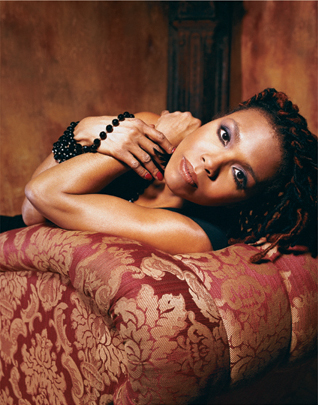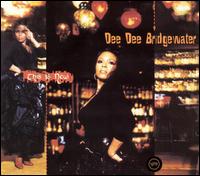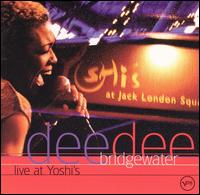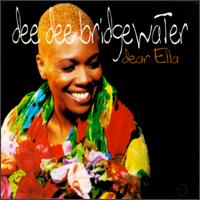

Courtesy of Dee Dee Bridgewater

Universal

Verve

verve
A FIRESIDE
CHAT WITH DEE DEE BRIDGEWATER
Jazz vocalists are in a catch 22. Jazz singing is virtually a lost art
form, while both Norah Jones and Diana Krall are respectively at the apex
of their popularity. The catch 22 is neither singer is a classic jazz
vocalist, say in the vein of Sarah Vaughan or Ella or Billie. So a Dee
Dee Bridgewater is in a marketing no man's land. A shame really, since
Ms. Bridgewater is one of merely a handful of singers doing jazz justice.
But alas, the world is cruel. I sat down with Dee Dee from her home to
speak about the state of jazz singing, her new album of Kurt Weill music,
This is New on Verve, and her future, as always, unedited and in her own
words.
FRED JUNG: Let's start from the beginning.
DEE DEE BRIDGEWATER: I have always sung jazz. My father was a trumpeter
and a music teacher and my mother loved vocalists and so I always heard
jazz in my home. When I started singing, I always sang the way I sing
today. I never liked learned about scatting. I found out a couple of years
ago from my mom that she was listening to a lot of Ella when she was pregnant
with me, so I am now inclined to believe the theory of playing the music
for the baby when they are in the womb is true because I always thought
that part of being a jazz singer was scatting. I always was able to do
it. I was into top forty radio. I grew up in Flint, Michigan so I listened
to, of course, Motown. I had my own group. We called ourselves The Iridescents.
I even had an audition with Motown and they were ready to sign me, but
they wanted me to come back when I graduated from high school. I used
to listen to all the female groups from way back to The Shirelles to when
Gladys Knight and the Pips up through all of the Motown catalog, Martha
Reeves & the Vandellas, The Marvelettes, The Supremes. I used to climb
out of my house on weekends to go and hear groups like Smokey Robinson
and the Miracles and The Four Tops. It was all of that. I grew up listening
to that. That was my music of preference and then my mom and dad played
their jazz records and jazz vocalists, so I heard a lot of more of what
we would call obscure jazz singers in the house. So I listened to Lorez
Alexandria who is in the same category as Sarah. Of course, mom played
Sarah, Sassy records. I listened to people like Nina Simone. I loved Harry
Belafonte. I was in love with Johnny Mathis. My first idol was Nancy Wilson.
I was always jumping at the bit to go hear Aretha Franklin (laughing).
And so very broad, I'm very broad, Fred. I used to love to watch Minnie
Pearl and The Grand Ole Opry, but now we're really dating ourselves.
FJ: You moved to France for a period.
DEE DEE BRIDGEWATER: I was in France from basically '86 until '99. I still
have a home there and I first plopped down there in '84, well, actually,
the end of '83 with Sophisticated Lady that I was starring in. I went
back in '86 to do a play about Billie Holiday called Lady Day until '99.
FJ: There is a certain appreciation you gain being across the Atlantic.
DEE DEE BRIDGEWATER: I felt a total creative and artistic freedom in France.
When I want to be creative, I go back to France. I just feel that I don't
have to worry about the stuff that has become so important over here.
I can really be an artist there, non-compromising. There is a lot more
respect for me and what I do in Europe and certainly in France, where
I am considered to be a big star. It's that. It is the creative and artistic
freedom. It goes deeper than that. It is really about marketing. I think
that the record industry is in the process of basically killing traditional
jazz in the United States because everything has got to have a gimmick
now. Everything has to be highly visible in order to sell because there
is just so much competition in the marketplace. So when you have a young
talent like Norah Jones being called a jazz singer, well then, people
believe that that is the beginning and the end of what a jazz vocalist
is supposed to be. So then the rest of us, especially someone as myself,
who was into more traditional jazz music, then we become passé.
We fall by the wayside and that is exactly what's happened. I heard recently
that someone who has had success through marketing and through the huge
support that she received from my label, Diana Krall, they are having
problems selling her now because she is also getting the Norah Jones backlash.
I was already getting the Diana Krall backlash and so I think that the
recording industry is becoming its own worst enemy. Instead of promoting
artists as just being artists, labeling, categorizing all this stuff that
is happening over here is becoming a disservice.
FJ: The extinction of art for art's sake.
DEE DEE BRIDGEWATER: It hasn't worked (laughing). My approach has not
worked. I just finished my last album for Verve and I don't know which
way that I'm going to be going to be quite honest, Fred. I don't know
that I'm going to still be with Verve. I'll know better about that next
week. My whole point is just that, Fred. Where is the art? And when is
there going to be a label that is going to market me for my multiple talents?
Why do we have to put these strict labels on it? I think if somebody was
to come out and say, "Here is a renaissance woman," and create
some kind of gimmick around my talent then maybe I could sell.
FJ: How do you approach theater?
DEE DEE BRIDGEWATER: Yeah, I still do theater. Number one, usually most
of the shows that I've done in theater, with the exception of Sophisticated
Lady, most of the shows that I've done have had a character involved and
so I've had to learn the character. For example, Billie Holiday or even
Cabaret, I was the first Black actress to do Sally Bowles in Cabaret.
For both of those shows, I did research. I did about four months of research
on Billie Holiday. I had people sending me video cassettes so I could
see her in live performance from television shows that were recorded.
I listened to interviews, radio interviews, anything where I could hear
her voice and see her speak and watch her mannerisms so that I could create
this character out of Billie Holiday and what I had learned about her
and my two cents that I wanted to add to the character development. You
have to know about that kind of stuff when you're doing theater. So what
I try to do when I sing a jazz song is find what that story is that that
song is about. What kind of personality that song has and I try and infuse
that into my interpretation of the song. So I look at songs more how can
I do this song on the stage as a jazz singer more than just the music.
I look at the full picture. In theater, you have to learn about being
in a space. You have to also go through your fear and you have to learn
about communicating with your audience because you are trying to get a
particular message across through the piece that you're doing and the
characterization that you're doing. It takes a whole other discipline.
Since I'm doing the Kurt Weill music now for my This is New album, I approach
this music more theatrically. I have to really be in the mindset of all
these songs so that I can really concentrate and give each song the kind
of personality that I want them to have.
FJ: Having done both studio and live recordings, do you have a preference?
DEE DEE BRIDGEWATER: No, they are just two different elements. A studio
is a more controlled element and live is of course, what you hear is what
you've got because I don't believe that if an artist is going to do a
live recording that they should allow themselves to go into the studio
and pick something that they don't like that they did. So live is like
kind of bearing it. That is my interpretation of live. You have two totally
different feelings. I'm a totally different artist live than I am in the
studio. I'm definitely what one would call an entertainer and live performer.
You get a fuller idea of me as the performer when you hear a live recording.
FJ: Last we spoke you had just finished recording the Dear Ella session.
Congratulations on your Grammy.
DEE DEE BRIDGEWATER: Oh, thank you, Fred.
FJ: Elaborate on the Diana Krall effect.
DEE DEE BRIDGEWATER: Well, there is no real competition because until
this album, I've always felt like the stepchild of the label. That's what
I call myself. Number one, I was signed to Verve Records in France. So
I'm signed through the French territory. I also was signed as a producer,
not as an artist, so that makes me completely independent. I basically
don't have to rely on anybody at the company for my ideas of what I'm
doing or anything, so I'm completely independent. I put my albums together
from the cover, the image that I want to project on the cover, how I want
it packaged, everything. I do that. So when I come to the States, it's
a prepackaged thing and I try and give them something to run with. I think
my situation, the fact that I was independent of the New York office and
the US territory, and was just a distribution situation for them, they
never felt the need to get behind me completely. So mine is a really odd
situation, but I definitely feel like I am in the shadow of Diana Krall.
Now there is also Natalie Cole and I can't compete with these women who
have had the kind of record sales and exposure that they've had here in
the United States. I haven't had that. I've never been given the opportunity.
So basically, being in that position is not a pleasant position to be
in. It is a very, at times, humiliating, at times, embarrassing, and certainly
an uncomfortable situation to be in.
FJ: My heart goes out to you. I lament Norman Granz' passing.
DEE DEE BRIDGEWATER: Oh, sure. I'm sure there is someone out there who
appreciates me for the me that I am and I certainly, I have a great deal
of respect for Tommy LiPuma and his producing and he's done wonderful
things with Diana Krall and Natalie Cole, but that is really not where
I want to go musically. Thank you, my dear.
Fred Jung is the Editor-In-Chief and can't believe Ozzy was crying on
TV, when he knows there is no crying in baseball. Comments? Email
Him